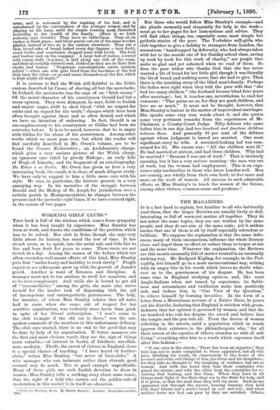WORKING GIRLS' CLUBS.* Tins book is full of the wisdom
which comes from sympathy when it has been taught by experience. Miss Stanley has been at work, and knows the conditions of the problem which has to be solved. Her club in Soho, though she says very little about its history, has stood the test of time. It has struck roots, so to speak, into the social soil, and bids fair to live and bear fruit for years to come. These roots are not struck in a day. Among the causes of the failure which too often overtakes well-meant efforts of this kind, Miss Stanley - puts first "undue hurry and inability to work slowly." People expect to see refinement grow up with the growth of Jonah's gourd. Another is want of firmness and discipline. A manager must not be too anxious to swell her numbers, and so be over-complaisant. And while she is bound to get rid of " irreconcilables " among the girls, she must also nerve herself for the harder task of dispensing with the aid of incompetent and unsympathetic patronesses. The lady, for instance, of whom Miss Stanley relates that all noise had to cease when she came, out of respect for her sensitive organisation, was evidently more harm than good, in spite of her liberal subscription. "I won't come to the club to-night if the old cat is there," was the out- spoken comment of the members at this unfortunate delicacy. The club once started, there is no end to the good that may be done by help of its organisation. If better manners are the first and most obvious result, they are the sign of things more valuable,—of interest in books, of kindness, unselfish- ness, modesty. Thrift, the rarest of virtues in England, there is a special chance of teaching. "I have heard of feather- clubs," writes Miss Stanley, "but never of boot-clubs." A wise manager who can insinuate rather than obtrude good counsel may do much. Nor is good example unprofitable. Many of these girls see such foolish devotion to dress in women (Miss Stanley tells a striking story about some roses), that the sight of a lady who carries out the golden rule of moderation in this matter is in itself an education.
• Clubs for Working Girls. By Maude Stanley. London : Macmillan and Co.
But those who would follow Miss Stanley's example—and she pleads earnestly and eloquently for help in the work— must go to her pages for her instructions and advice. They will find other things, too, especially some most simple but pathetic stories of the poor. The Yorkshire raill-girls, who club together to give a holiday to strangers from London, the seamstress, "handicapped by deformity, who had always taken with her to the seaside one of her Sunday-school class, saving up week by week for this work of charity," are people that make us glad and yet ashamed when we read of them. So does the poor widow who thanks God that she has never wanted a bit of bread for her little girl, though it was literally the bit of bread, and nothing more, that she had to give. Then there is the touching story of the blind man's family. Perhaps the ladies were right when they told the poor wife that "she had too many children" (the husband became blind four years after marriage) ; but it touches one, nevertheless, to read her comment : "That pains me so, for they are good children, and love me so much." It must not be thought, however, that Miss Stanley is lenient in the matter of improvident marriages. She speaks some very true words about it, and she quotes some very pertinent remarks from the experiences of Mr. Chalmers, a County-Court Judge. Fifty debtors who came before him in one day, had two hundred and fourteen children between them. And generally 98 per cent, of the debtors against whom judgment is issued are married. One most significant story he tells. A wretched-looking lad was sum- moned for £2. His excuse was : "All the children were ill." He had married at sixteen, and had three children. Why had he married P "Because I was out of work." That is intensely amusing, but it has a very serious meaning : the man was out of work, but the woman had employment. This is an expe- rience only too familiar to those who know London well. Men are coming, not wholly from their own fault, to live more and more on the work of women. All success to such admirable efforts as Miss Stanley's to teach the women of the future, among other virtues, common-sense and prudence !


































 Previous page
Previous page